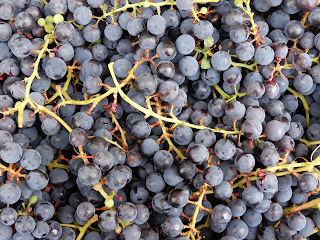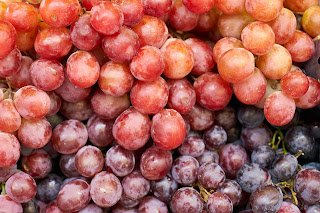All about resveratrol: the insanely healthy component of wine
Get an online course on winemaking and become an expert of this art!
Wine has been enjoyed for centuries for its sensory and social pleasures. It's often associated with relaxation, celebration, and fine dining. However, wine is not just a luxury item; it's also a source of natural compounds that could benefit our health. One of these compounds is resveratrol, a polyphenol found in grapes, berries, peanuts, and Japanese knotweed. Resveratrol has been studied extensively for its potential health benefits, especially in relation to cardiovascular disease, cancer, and neurodegenerative disorders. In this article, we'll explore the benefits, risks, and health implications of resveratrol in wine in more detail.
What is Resveratrol?
Resveratrol is a natural compound found in various plant sources. It belongs to the family of polyphenols, which are organic compounds that have multiple phenol (aromatic alcohol) groups. Resveratrol has several isomers (molecules with the same chemical formula but different structure), the most common of which is trans-resveratrol. It's found in grape skins, seeds, and stems, and is synthesized by grapevines as a defense mechanism against fungal infections, UV radiation, and other stresses.
How is resveratrol “made”?
Resveratrol is a natural compound produced by grape vines and other plants as a defense mechanism against environmental stressors such as UV radiation, pests, and pathogens. In grape vines, resveratrol is synthesized primarily in the skins and seeds of grapes during the ripening process. It is then transferred to the grape juice and ultimately to the wine during the fermentation and aging process.
The synthesis of resveratrol in grape vines is a complex process involving several enzymes and metabolic pathways. The key enzyme responsible for resveratrol biosynthesis is stilbene synthase, which catalyzes the conversion of phenylalanine to trans-resveratrol. This reaction is activated by various stimuli, such as light, heat, and fungal infection, which trigger the expression of stilbene synthase genes in the vine's genome.
Other factors that can affect the production of resveratrol in grape vines include the grape variety, soil conditions, irrigation, and climate. For example, grapes grown in cooler climates and higher altitudes tend to have higher resveratrol content than those grown in warmer regions. Similarly, organic or biodynamic farming practices that reduce the use of pesticides and fertilizers can enhance the production of resveratrol and other beneficial compounds in grapes.
Get an online course on winemaking and become an expert of this art!
Resveratrol Benefits
Resveratrol has been associated with several health benefits, although its effects in humans are still being researched and debated. Here are some of the potential benefits of resveratrol:
Cardiovascular health: Resveratrol has been shown to improve blood flow, lower blood pressure, reduce inflammation, and prevent blood clots. These effects could help reduce the risk of cardiovascular disease, which is a leading cause of death worldwide.
Cancer prevention: Resveratrol has been shown to inhibit the growth and spread of cancer cells, induce apoptosis (cell death) in cancer cells, and enhance the efficacy of chemotherapy and radiation therapy. These effects could help prevent and treat various types of cancer, such as breast, colon, prostate, and lung cancer.
Neuroprotection: Resveratrol has been shown to protect the brain and nervous system from degeneration, possibly by reducing oxidative stress, inflammation, and amyloid-beta plaques. These effects could help prevent or delay the onset of neurodegenerative disorders, such as Alzheimer's and Parkinson's disease.
Anti-aging: Resveratrol has been shown to activate sirtuins, a class of enzymes that regulate cellular metabolism, stress response, and DNA repair. Sirtuins are thought to play a role in aging and age-related diseases, and resveratrol has been touted as a potential anti-aging agent.
Anti-inflammatory: Resveratrol has been shown to reduce inflammation in various tissues and organs, including the heart, liver, brain, and gut. Chronic inflammation is a common feature of many chronic diseases, such as diabetes, obesity, and autoimmune disorders, and resveratrol's anti-inflammatory effects could help alleviate their symptoms.
Resveratrol in Wine
Wine is one of the richest dietary sources of resveratrol, especially red wine. Red wine contains more resveratrol than white wine, as the resveratrol is mostly found in the skin of grapes, which is removed in the production of white wine. The amount of resveratrol in wine depends on various factors, such as the grape variety, the region, the vintage, and the winemaking process. Grapes grown in cooler, more challenging climates tend to have higher resveratrol content than those grown in warmer, more hospitable climates.
The resveratrol content of wine has been studied extensively, and the results are somewhat inconsistent. Some studies have reported high levels of resveratrol in certain wines, while others have found low or undetectable levels. One reason for this discrepancy is that resveratrol content can vary greatly between different wine brands, even if they use the same grape variety and region. Other factors that can affect resveratrol levels in wine include the duration of fermentation, the aging process, and the addition of preservatives and other chemicals.
Despite the variability of resveratrol levels in wine, some studies have suggested that moderate wine consumption may have health benefits, particularly for cardiovascular health. The "French Paradox" is a well-known example of this phenomenon, where the French population has a relatively low incidence of cardiovascular disease despite a diet high in saturated fats. Some researchers have attributed this to the high consumption of red wine in France, which is rich in resveratrol and other polyphenols.
However, it's important to note that excessive alcohol consumption can have negative health effects, such as liver disease, cancer, and addiction. Therefore, the potential health benefits of resveratrol in wine should be weighed against the risks of alcohol consumption, and moderation is key. The American Heart Association recommends that women limit their alcohol intake to one drink per day, and men to two drinks per day, to minimize the risk of cardiovascular disease.
Get an online course on winemaking and become an expert of this art!
History of resveratrol
The history of resveratrol dates back to the early 20th century, when it was first isolated from the roots of white hellebore (Veratrum grandiflorum) by Japanese scientists. However, it wasn't until the 1990s that researchers began to investigate the potential health benefits of resveratrol.
In 1992, a study published in the journal Nature reported that resveratrol could inhibit the growth of cancer cells in laboratory experiments. This was followed by a series of studies that showed resveratrol had numerous other potential health benefits, including cardiovascular protection, neuroprotection, anti-inflammatory effects, and anti-aging effects.
The discovery of resveratrol's potential to extend lifespan and delay age-related diseases in animal models was particularly groundbreaking. In 2003, a study published in the journal Nature reported that resveratrol could extend the lifespan of yeast cells by up to 70%, and in 2006, a study published in the journal Cell reported that resveratrol could extend the lifespan of mice on a high-calorie diet.
These studies sparked widespread interest in resveratrol and its potential as a longevity and anti-aging supplement. In the years since, numerous studies have investigated resveratrol's effects on human health, with mixed results. While some studies have reported significant health benefits, others have failed to show any significant effects. Nevertheless, resveratrol continues to be a topic of intense scientific and public interest, and researchers are continuing to investigate its potential as a health-promoting compound.
Resveratrol Supplements
In addition to wine, resveratrol supplements are available in various forms, such as capsules, tablets, and liquids. These supplements are marketed as a natural alternative to prescription drugs for various health conditions, such as high blood pressure, high cholesterol, and cancer. However, the efficacy and safety of resveratrol supplements are still a matter of debate, as most of the research has been conducted in animals or cell cultures, and the results are not always consistent.
Some studies have suggested that resveratrol supplements may have beneficial effects on cardiovascular health, cognitive function, and inflammation. However, other studies have found no significant effects or even adverse effects, such as gastrointestinal discomfort and allergic reactions. Moreover, the long-term safety of resveratrol supplements is not yet established, as there have been few clinical trials in humans.
Therefore, if you're considering taking resveratrol supplements, it's important to consult with your healthcare provider first, especially if you have any underlying health conditions or are taking medications. Resveratrol supplements may interact with certain drugs, such as blood thinners and antihypertensive agents, and may not be safe for pregnant or breastfeeding women.
Get an online course on winemaking and become an expert of this art!
Conclusion
Resveratrol is a natural compound found in various plant sources, including grapes and wine. It has been associated with several potential health benefits, such as cardiovascular health, cancer prevention, neuroprotection, anti-aging, and anti-inflammatory effects. However, the efficacy and safety of resveratrol in humans are still being researched and debated, and excessive alcohol consumption can have negative health effects. Therefore, moderation is key, and resveratrol supplements should be taken with caution and under the guidance of a healthcare provider.
For those interested in further scientific research, these books may have a word about this topic.
"The Longevity Factor: How Resveratrol and Red Wine Activate Genes for a Longer and Healthier Life" by Joseph Maroon and Jeffrey Bost
"Resveratrol: State of the Art Science and Health Applications" edited by Bharat B. Aggarwal and Shishir Shishodia
"Resveratrol in Health and Disease" edited by Takuji Shirasawa, Junji Terao, and Yoshiko Nakamura
"Resveratrol: Sources, Health Benefits and Mechanisms of Action" edited by Michael A. Vital, Laura I. Ruffolo, and Amy N. Johnson
"Resveratrol and Health" edited by Ronald Ross Watson and Victor R. Preedy
Get an online course on winemaking and become an expert of this art!






Comments
Post a Comment